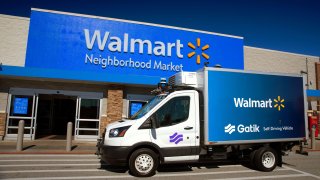
- Walmart and Silicon Valley start-up Gatik said that, since August, they've operated two autonomous box trucks, without a safety driver, on a 7-mile loop daily for 12 hours.
- "Taking the driver out is the holy grail of this technology." Gatik CEO Gautam Narang, who founded the company in 2017, told CNBC.
Walmart said Monday it has started using fully driverless trucking in its online grocery business, aiming to increase capacity and reduce inefficiencies.
Walmart and Silicon Valley start-up Gatik said that, since August, they've operated two autonomous box trucks — without a safety driver — on a 7-mile loop daily for 12 hours. The Gatik trucks are loaded with online grocery orders from a Walmart fulfillment center called a "dark store." The orders are then taken to a nearby Walmart Neighborhood Market grocery store in Bentonville, Arkansas, where Walmart is headquartered.
Get Philly local news, weather forecasts, sports and entertainment stories to your inbox. Sign up for NBC Philadelphia newsletters.
The program began in December 2020 after getting approval from the Arkansas State Highway Commission. The safety driver was pulled over the summer. The partnership is focused on the so-called middle mile — the transport of goods within the supply chain most often from a warehouse to a fulfillment center or a warehouse to a retailer.
"We're thrilled to be working with Gatik to achieve this industry-first, driverless milestone," Walmart senior vice president Tom Ward said in a news release about the project. "Through our work with Gatik, we've identified that autonomous box trucks offer an efficient, safe and sustainable solution for transporting goods on repeatable routes between our stores."
"Taking the driver out is the holy grail of this technology." Gatik CEO Gautam Narang, who founded the company in 2017, told CNBC. "Having the trust from the world's largest retailer has been a massive boost for what we do and is a validation for our technology, our solution, our progress."
Money Report
Walmart, the nation's biggest seller of grocery items, is testing the Gatik autonomous vehicles as part of its transition to a "hub and spoke" model for grocery delivery where dark stores are closer to the consumer and used to serve several retail stores. Walmart said the use of automated vehicles will also allow store associates more freedom to perform "higher level" tasks, including picking and packing online orders and customer assistance.
"The old architecture of delivery where you have a giant distribution center four or five hours away from the end consumer does not work anymore. Grocers are forced to set up these fulfilment centers close to the customer, and once you get close to the customer you have to shrink the size of your warehouse," Narang said. "As the size shrinks there is a growing need for doing repeated trips from the fulfillment centers to the pickup points. That's where we come in."
The Kroger supermarket chain has tested autonomous delivery with start-up Nuro since 2018 and said it's now completed thousands of "last mile" deliveries in the Houston, Texas area. Kroger is also using automated warehouses to launch online grocery delivery in Florida and other states where it does not have brick and mortar locations.
Albertsons, which operators supermarkets including Safeway and Kings, is testing "last mile" delivery with start-up Tortoise in Northern California. The remote-controlled Tortoise carts are filled with groceries by employees at the store. The carts are then operated remotely by Tortoise "drivers" that use an Xbox controller to navigate to the customer's home.
Gatik said its autonomous vehicles can also reduce logistics costs by as much as 30% for a grocery business. Grocery typically has thin margins ranging from 2% to 4%, according to research from Bain and Company.
Walmart and Gatik are running similar tests in the New Orleans-area using an electric box truck with a safety driver to move online grocery orders from a Walmart Supercenter to a customer pickup location.
Narang said the AVs also can help companies mitigate the impact of the nation's labor shortage on supply chains outside of the grocery business.
"This solution is very relevant across different supply chains, different kinds of logistics," Narang said. "It's not just about the labor shortage. It's all about increasing efficiency, helping with the operating costs."






